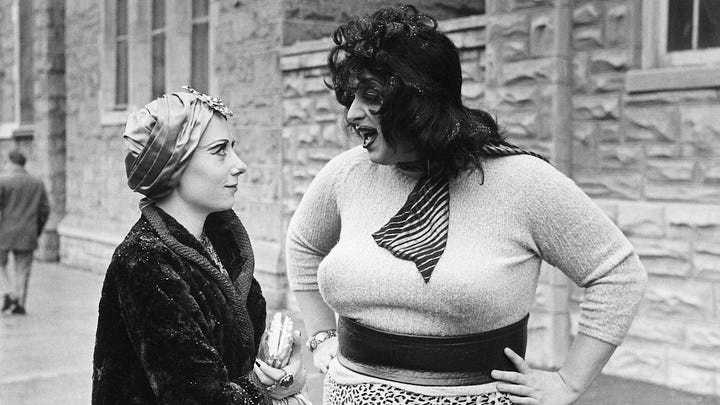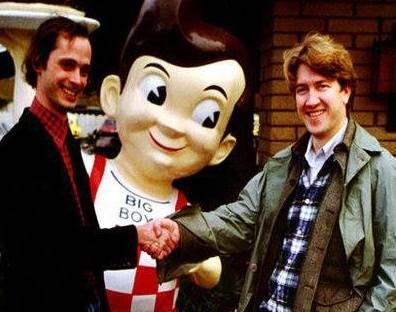David Lynch and John Waters: Shared Fascination With the American Psyche
Revealing the dark truths in our optimism.
If you caught my last post, you know I have a deep affinity for American auteur filmmaker David Lynch. He’s one of my creative heroes and someone whose work I come back to over and over again. After revisiting his 1984 adaptation of Dune, I got to thinking about what makes his visual and directorial style so distinctive and compelling. He’s often placed in a class with other American cinema titans like Scorsese, Coppola, and Spielberg but in considering his body of work more deeply, I think a more illuminating comparison in terms of style, theme, and impact is the great and grisly John Waters.
I’m sure I’m not the first to have this thought, as both filmmakers’ careers bridged an arty-outsider beginning to later mainstream success. They are both inarguably two of the most influential filmmakers of their generation and have both maintained a fierce commitment to all things strange. And that’s just where the similarities begin. They were both born in 1946, both born from middle-class American families, and are both big fans of Lana Del Rey. More tellingly, they both have a background and passion for fine arts, giving them another creative outlet to develop their visual storytelling abilities that aren’t confined by literalism, form or convention.
What’s more, the two are seemingly also fans of each other. Waters has complemented Lynch at various points in his career. In 1979, they were photographed shaking hands outside of a Bob’s Big Boy Restaurant (see above), which is as wholesome as it is gonzo - a fitting combination for two artists who made names for themselves skewering the iconography and philosophies of American culture.
But if these were the only commonalities they shared, the comparison would be merely superficial. You have to look at their films to really understand the deep waters of their shared fascination with the American psyche and the cunning ways they subvert norms to provide audiences with memorably disturbing experiences. If you’re unfamiliar with their works, I hope that in comparing these two pairs of their films you are inspired to take a walk on the wild side, a trip to the Black Lodge, and to bathe in delicious filth.
Multiple Maniacs (1970) vs. Eraserhead (1977)


Made seven years apart, Multiple Maniacs and Eraserhead mark the first feature-length films made by each director - coincidentally both shot in black and white. Both directors had spent years making shorts and beginning to hone their style and then took big artistic swings in the making of their respective feature debuts. In both films, they work with performers who would become long-time collaborators. Maniacs star Divine is featured in many of Waters’ most famous works, while Jack Nance stars in the first of many Lynch projects here (though my personal favorite of their collaborations will always be Twin Peaks).
What strikes me most about these two films, beyond their outright refusal to put the audience at ease, is the way they approach shooting fringe urban landscapes. Maniacs, not surprisingly, was shot in and around Baltimore (famously Waters’ hometown) and follows the ringleader of an obscene carnival as she descends into madness. Eraserhead was shot in Los Angeles as Lynch was attending film school at AFI, and marks the beginning of Lynch’s fascination with the seedy underbelly of Los Angeles’ industrial outskirts while being heavily influenced by his time living in a resource-starved neighborhood in Philadelphia. It follows father Henry Spencer as he attempts to care for his deformed child while questioning his own reality.
Both films are gritty, violent, and graphic, but hold a certain perverted tenderness that is both winning and uneasy. By occupying a space that is neither full realism nor total fantasy, the lines between what is and what isn’t, what is beautiful, moral, and lovable versus hideous, depraved, and disgusting collapses in on itself. The films are an opening salvo in what will become a decades-long war the two filmmakers wage on the limits of taste and convention and peeling back the beautiful layers of delusion that prop up our ideas of American optimism and the American family to reveal the dark truth about the American dream.
Blue Velvet (1986) vs. Serial Mom (1994)


In line with the themes established in their early careers, these two films really attack all the trappings of American suburban life and force us to confront our darker natures. However, what I think is most interesting in comparing these two more mid/late career entries is the ways they find common ground by occupying space at either end of two genre extremes: melodrama and camp.
Though both films open with the blue skies and white picket fences that adorn the lives of upper-middle-class Americans, each film takes wildly different tonal approaches to unpack the rot beneath those manicured lawns. With Blue Velvet, Lynch tells the twisting tale of college boy Jefferey Beaumont (Kyle MacLachlan), who gets sucked into a dark world of sexual terror and organized crime as he attempts to rescue seductive lounge singer Dorothy (a captivating Isabella Rossellini) from the violent clutches of Dennis Hopper’s Frank. The film is a clear example of melodrama being done right in that he uses the tools of the form to show the audience how close we all live to the edge. In utilizing a more heightened tone in dialogue and story structure, as well as his usual filmmaking technical flair, Lynch creates a more deeply disturbing universe that exists parallel to the normie suburban safety that we all take for granted. And makes us question how comfortable any of us can really claim to be.
Similarly, in Serial Mom, Waters skewers the nuclear family to great comedic effect in this riotous story of a bland housewife who goes on a murderous rampage in her community. Kathleen Turner’s performance is the epitome of camp - a descriptor whose definition remains elusive to many. The word “camp” has historically been used to describe a collection of aesthetics and mannerisms that, though aligned with gay culture and drag performance, is not limited to it. It refers to a way of performing that is innately over the top, one that reverses the power dynamic between highbrow and lowbrow and flips the script on what is an acceptable way to present. At its core, camp should be aiming for some element of our culture that is considered “normal” and making it ridiculous, while taking that which is rejected and making it fabulous. Serial Mom does this by taking the archetype of the suburban housewife and making her a murderous lunatic with an unquenchable bloodlust. Both films are a great watch and really put into focus how both Lynch and Waters think about American suburban life.
The thing I love most about their films is that they are meant to be experienced more than understood. So go experience them! I see something new every time I watch their films and I hope you do too.
What makes both of these men so great is their refusal to take themselves too seriously:
“I don't think that people accept the fact that life doesn't make sense. I think it makes people terribly uncomfortable.” David Lynch
“I pride myself on the fact that my work has no socially redeeming value.” John Waters





